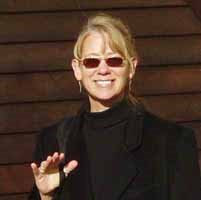Creators create content—they write articles, blog, maintain a web site, upload video or audio.
Critics comment and respond to content. They write reviews, post comments on blogs, or contribute to forums.
Collectors help to organize the web by saving URLs on bookmarking services (like del.icio.us), voting for sites (Digg), or using RSS feeds. (I don't really understand this category yet.)
Joiners maintain a profile on a social network site. The authors put this group at 25% of the adult online population, but the number is growing rapidly. In an article in the Oregonian, Peter Ames Carlin wrote that the number of Facebook members, age 30+, grew 200% in 2008.
Spectators look but don't participate.
Inactives have internet access but do not participate.
The point the authors make is how important it is to know who you're marketing to and how the different groups interact.
In terms of trying to reach these online "personalities," I have a few questions that I hope the book will answer:
Do people's online activities predict their purchasing behavior? A person is probably a creator only in a particular field or area of interest and participates at a lower level in other areas. But I also image that they tend to be early adapters—always the first to buy new gadgets or try new technologies. We already know early adapters are crucial to product launches and influence public opinion, but how hard (and expensive) is it to influence the influencers?
As online marketers, is it effective to reach these groups in their playground? Are marketing and advertising efforts on the web seen as nothing more than an intrusion and received with skepticism and mistrust?
Are these categories just another way to describe personality types? Or do people behave differently from their personality type online?
With the online world changing so rapidly, is it even feasible to keep track of all this? I can imagine someone moving quickly from a spectator to a critic to a creator as they become more comfortable with the technology. How do you focus on a moving target? Millions of moving targets?
I'm not sure where I fall on the spectrum of the social networking population. Since I'm blogging twice a week, I'd have to put myself into the creator category at the moment. But my blogging activity will probably end right about mid-March. I guess I'm a joiner, but I feel more like a spectator. I've been a member of LinkedIn for years but never did more than fill out my profile. And recently, I joined Twitter and Facebook, but I don't know that I'll keep those accounts active for long. I don't feel compelled to share much, but I will admit to wasting a fair amount of time seeing who's out there.
Curious if anyone out there feels like slapping a category on for size. I have my suspicions.

Neat little categories, but I also wonder how this information is useful. It reminds me of the notion that no matter how democratic the Web becomes,power will still lay with a small number of 'influencers,' and a book review or mention by them is to be valued above all others. This is human nature, I suppose. But who are the influencers now?
ReplyDeleteThe categories are interesting. I suppose you always have to beware of gross generalizations, but there's something to it. I can imagine that some people maintain their real-world tendencies online, in terms of joining or organizing. I can also imagine that the relative anonymity of the Internet entices others to assume very different personas. It's also interesting how easily a person can move from one category to another, within the space of a few minutes, both online and off. People are not so easily pinned to the wall. But if you want to market effectively to people, you do need to have some sense of where to find them, and I think the categories are a useful way of thinking about who goes where online.
ReplyDelete